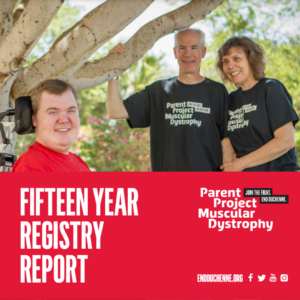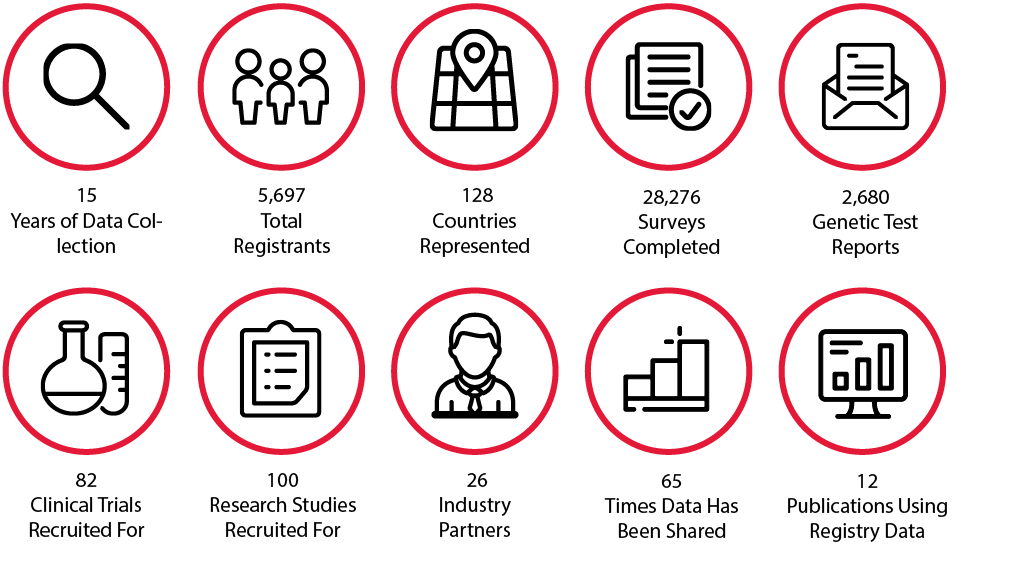 PPMD is excited to announce the release of the 15 Year Registry Report. This report is the culmination of data provided by registrants in The Duchenne Registry, as well as collaborative work with expert clinicians and researchers over the past 15 years. The Duchenne Registry is the largest, most comprehensive patient-reported registry for Duchenne and Becker muscular dystrophy.
PPMD is excited to announce the release of the 15 Year Registry Report. This report is the culmination of data provided by registrants in The Duchenne Registry, as well as collaborative work with expert clinicians and researchers over the past 15 years. The Duchenne Registry is the largest, most comprehensive patient-reported registry for Duchenne and Becker muscular dystrophy.
Ann Martin, Vice President of Community Research and Genetic Services, explains the process the organization went through to compile this report:
“At the end of 2022, when the Registry reached its 15-year anniversary, we queried and exported all de-identified data from the Registry. We worked with a team of statistical analysts, who performed the requested statistical analyses and provided PPMD with the visualizations used in the report. The PPMD Registry team reviewed all analyses and composed the report. With the volume of data collected over 15 years, there remains additional analyses that PPMD is currently exploring.”
According to PPMD Founding President and CEO, Pat Furlong,
Download the Report“Families affected by Duchenne and Becker muscular dystrophy do not always receive the most up-to-date information on care and treatments. The Duchenne Registry has provided families access to top researchers and clinicians in the field, as well as notification about clinical trials that may help their child. And by participating in The Duchenne Registry, families can take an active role in helping to improve care for all people living with Duchenne and increase understanding of the disorder.”
USE OF DATA
The de-identified data in The Duchenne Registry has been used by researchers and sponsors to advance care and treatments for individuals with Duchenne. Over the past 15 years, data has been exported and shared with researchers nearly 65 times, including multiple exports to the TREAT-NMD International Neuromuscular Registry. To date, 13 publications have used data from The Duchenne Registry. Numerous posters and presentations at scientific meetings have referenced the Registry data.

In the past 15 years, the Registry team has used the data to identify and connect individuals with Duchenne and Becker to over 80 actively recruiting clinical trials and over 100 non-interventional research studies. In addition, data from the Registry has been utilized by PPMD to identify community needs and priorities.
Download the ReportA LOOK AT THE RESULTS
The 15 Year Registry Report is a summary of approximately 5,500 registrants representing nearly 125 countries. To participate, a registrant must have a diagnosis of Duchenne or Becker muscular dystrophy. Participants in the Registry at the time the report was compiled include: 75% with Duchenne, 8% with Becker, 7% with Duchenne or Becker (diagnosis unclear), and 10% female carriers.
The 32-page report reveals a number of interesting data points PPMD believes will be important to researchers and industry partners. Some of those findings include:
Diagnostic delay
Analyses revealed that the average age at diagnosis is 4.2 years for Duchenne and 10.8 for Becker. The average age when symptoms were first noticed was 2.8 years for Duchenne and 8.0 years for Becker.
Genetic variants
The three most common categories of genetic variants in registrants are whole exon deletions (64%), nonsense variants (12%), and whole exon duplications (11%). Approximately 30% of registrants are amenable to one of the approved exon skipping therapies (for skipping of exon 51, 53, or 45).
Corticosteroids
The average age at initiation of corticosteroids is 5.9 years for Duchenne registrants.
Most registrants in the United States report taking corticosteroids daily (83%). However, the percentage of registrants using weekend (also called twice-weekly) dosing increased, with registrants born more recently (during or after 2010) being more likely to use a weekend dosing schedule than those who were born before 2010 (28% versus 9%).
Loss of ambulation
The Registry data clearly demonstrates that registrants using deflazacort maintain ambulation longer than registrants using prednisone or no corticosteroids. The average age at loss of ambulation for registrants who never used corticosteroids was 10.5 years, for prednisone users was 10.8 years, and for deflazacort users was 12.0 years.
Cardiac screening
The use of echocardiogram and cardiac MRI in Duchenne increased across most age groups when comparing the time periods 2007-2012, 2013-2017, and 2018-2022 with some age groups having statistical significance. More consistent cardiac screening may be a reflection of better adherence to the standard of care guidelines, first published in 2010 and updated in 2018.
Pulmonary screening
For Duchenne registrants, the use of pulmonary function tests increased from 2007–2012 to 2013–2017, but then decreased in the most recent time period, 2018–2022. This may be because many clinics temporarily paused doing pulmonary function testing during the COVID-19 pandemic.
Scoliosis
Non-corticosteroid users were 4 times more likely to develop scoliosis than those who currently use corticosteroids.
Clinical trial participation
33% of Duchenne registrants and 12% of Becker registrants in the United States reported either currently or previously participating in a clinical trial.
Female carriers – NEW!
New in the 15 Year Registry Report is a section devoted to female carriers. For several years, PPMD has been focused on raising awareness and increasing knowledge about carrier health issues.
Download the ReportWHAT’S NEXT FOR THE DUCHENNE REGISTRY?
Several upgrades are planned for 2023 to make participating in the Registry easier and more accessible to all families. PPMD recently launched a Spanish version of the Registry app (available on both iOS and Android), and is developing a new web portal for users who prefer using a web interface over an app. Both the Registry app and the web portal are executed in partnership with THREAD Research, a company specializing in remote/virtual patient research.
With the forthcoming integration of electronic health records from multiple hospitals across the country, patient-reported data will soon be combined with clinic data to create the most robust longitudinal natural history database for Duchenne, called the Duchenne Outcomes Research Interchange. PPMD continues to work toward breaking down silos around patient data so that we, as community, can learn more about Duchenne faster.
THANK YOU, REGISTRY PARTICIPANTS
PPMD is grateful for every individual and family who has participated in The Duchenne Registry. The contributions made by those in the Duchenne community have been instrumental in advancing research and understanding of the disorder.
Thank you for your dedication in helping us make a positive difference in the lives of those with Duchenne!
THE HISTORY OF THE REGISTRY
The Duchenne Registry (formerly DuchenneConnect) began in 2007, when a group of thought leaders in the Duchenne and Becker muscular dystrophy community began discussing the need for a new kind of resource that would connect and serve the needs of the entire community. What they envisioned was a central hub that would bring together those living with Duchenne or Becker, along with their families and caregivers, to connect them with medical research, clinical care, clinical trials, and each other. At the same time, it would also be a resource for researchers and industries with an interest in Duchenne, allowing access to aggregate, de-identified data provided by patients and their families — information that could prove vital to advances in care and treatment. Today, the result of this endeavor is The Duchenne Registry, the largest, most comprehensive registry for Duchenne and Becker muscular dystrophy and female carriers.
Since 2011, The Duchenne Registry has been funded entirely by PPMD, and PPMD is the sole guardian of the Registry and its material. PPMD is deeply committed to the Registry to ensure that it is serving the needs of the entire Duchenne and Becker community.


